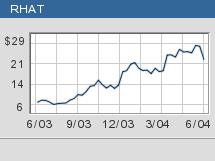
SAN FRANCISCO (CNN/Money) -
It's no mystery why investors may be turning away from Red Hat: The company's stock price has plummeted almost 30 percent since June 7.
But I think this is exactly the time to pay attention to the Raleigh, N.C., Linux company.
The stock, which shot from $5.95 all the way up to $29.06 during the course of this year, plummeted on two bits of news in the last couple of weeks.
First came the surprise resignation of CFO Kevin Thompson, which was announced just three days before the company reported its first-quarter earnings for 2005.
"When a resignation for 'family reasons' is announced that close to earnings, nine times out of 10 it means bad things," says Dion Cornett, managing director with Decatur Jones. "Red Hat didn't do a good job handling the news." Cornett doesn't own Red Hat shares, and Decatur Jones doesn't have a banking relationship with the company.
The second piece of news was the earnings release. As a whole, the quarter was a strong one for Red Hat, but nervous investors drove the stock down anyway.
The company reported $41.6 million in revenue, up 13 percent from the previous quarter, and it improved its earnings to $10.7 million, up 113 percent from the previous quarter and an astounding 603 percent from the year-ago period. But Red Hat had predicted that it would bring in $43 million, and so investors delivered their punishment.
Some punishment is to be expected
The company deserves some of the beating it's taken. Announcing the CFO resignation at that time and for those reasons guaranteed that people would assume the worst.

"Red Hat felt that this was information that should be disclosed to its core constituency of customers and investors," said a spokesperson in an e-mailed statement. "The company feels it is their responsibility to be as open and transparent with material information like this."
And the company did miss its revenue projections by $1.4 million. When a stock is priced for perfection, nervous investors will pounce on any miss.
But the revenue miss is relatively minor compared with the strong gains and fundamentals posted by the company.
"Look at their guidance," suggests Terry Tillman, an analyst with Schwab Soundview Capital Markets, pointing out that the company is projecting it will sign on 85,000 to 89,000 new subscriptions to its Linux service next quarter.
"To put it in perspective, two quarters ago, they did 60,000. That's strong testament that the model is starting to work." Schwab Soundview doesn't own Red Hat shares and doesn't have a banking relationship with the company.
Future stock gains for Red Hat likely won't equal the magnitude seen by the firm during the past year, but I believe the company is in the right position in this still-emerging marketplace, and it is poised for growth.
Linux-savvy investors may want to scoop up some shares while they're being unfairly hammered, but you should know going in that with a nosebleed P/E ratio of 173, this is a volatile stock. With a valuation already sky-high by traditional measures, any numbers miss will occasion a fair amount of hysteria.
Any investor buying into the stock, therefore, should do so with caution and not necessarily expect the kind of quick gains the stock has seen this year.
"The easy money was made in the stock when it was at $5," Cornett says. "Linux isn't the secret it was a year ago. You have to swim crosscurrent at times and be a bit contrarian to make money with this stock going forward."
Sign up to receive the Tech Investor column by e-mail.
Plus, see more tech commentary and get the latest tech news.

|

